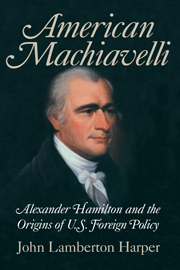Book contents
- Frontmatter
- Contents
- List of Illustrations
- Acknowledgments
- Miscellaneous Frontmatter
- Introduction
- PART I THE COMING OF NECESSITY
- PART II BATTLE LINES ARE DRAWN
- 3 At Washington’s Side Again, 1789
- 4 Hamilton versus the Virginians, 1789–1791
- 5 The Nootka Sound Crisis, Part One: The Morris Mission
- 6 Nootka Sound, Part Two: The View from New York
- 7 Liaisons Dangereuses, 1791–1792
- PART III SEIZING THE HELM
- PART IV INFORMAL ADVISER TO THE PRINCE
- PART V A PRINCE IN HIS OWN RIGHT?
- PART VI THE LESSER OF EVILS
- Conclusion: Hamilton Then and Now
- Notes
- Bibliography
- Index
3 - At Washington’s Side Again, 1789
Published online by Cambridge University Press: 05 April 2013
- Frontmatter
- Contents
- List of Illustrations
- Acknowledgments
- Miscellaneous Frontmatter
- Introduction
- PART I THE COMING OF NECESSITY
- PART II BATTLE LINES ARE DRAWN
- 3 At Washington’s Side Again, 1789
- 4 Hamilton versus the Virginians, 1789–1791
- 5 The Nootka Sound Crisis, Part One: The Morris Mission
- 6 Nootka Sound, Part Two: The View from New York
- 7 Liaisons Dangereuses, 1791–1792
- PART III SEIZING THE HELM
- PART IV INFORMAL ADVISER TO THE PRINCE
- PART V A PRINCE IN HIS OWN RIGHT?
- PART VI THE LESSER OF EVILS
- Conclusion: Hamilton Then and Now
- Notes
- Bibliography
- Index
Summary
Introduction
Hundreds of years before eighteenth-century Britain, medieval Italian communes like Venice and Florence had experimented with the system of a funded debt, whereby receipts from indirect taxes were dedicated to the repayment of loans received (or forced) from the citizenry. Machiavelli’s pungent observations to the effect that money was not “the nerve of war,” and that “gold is not sufficient to find good soldiers, but good soldiers are more than sufficient to find gold,” have lent themselves to the view that he was indifferent to questions of finance. In reality, such statements were part of his polemic against reliance on mercenary forces. One of his most incisive pieces of writing as a young Second Chancery official was “Parole da dirle sopra la provisione del danaio” (“Words to pronounce on the provision of money”), a speech intended for delivery by the gonfaloniere in April 1503.
The previous year Florence had been forced to deal with the revolt in the Valdichiana and found itself practically defenseless in the face of Cesare Borgia’s depredations. The emergency underlined the urgent need to strengthen the republic’s institutions – for fear of tyranny, the chief magistrate and members of the signoria were changed every two months. In September 1502, after much hand-wringing and debate, it was decided to create a gonfaloniere a vita (for life). Soderini, elected to the office, wrote Machiavelli that Florence’s financial situation was in a very disordered state. In February–March 1503, he presented seven proposals for the raising of new taxes. All were rejected, prompting him to turn to Machiavelli for a persuasive argument.
- Type
- Chapter
- Information
- American MachiavelliAlexander Hamilton and the Origins of U.S. Foreign Policy, pp. 43 - 54Publisher: Cambridge University PressPrint publication year: 2004



